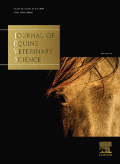
JOURNAL OF EQUINE VETERINARY SCIENCE
Scope & Guideline
Pioneering insights in equine veterinary science.
Introduction
Aims and Scopes
- Equine Health and Disease Management:
Focuses on the diagnosis, treatment, and prevention of diseases in horses, including infectious diseases, metabolic disorders, and musculoskeletal injuries. - Reproductive Medicine and Embryology:
Covers studies related to equine reproduction, including embryo transfer techniques, reproductive health, and fertility management. - Nutrition and Feeding Practices:
Explores the nutritional needs of horses, the effects of various feedstuffs on health, performance, and digestive physiology. - Biomechanics and Performance Evaluation:
Investigates the biomechanics of equine movement and performance, analyzing factors that influence athletic ability and injury risk. - Welfare and Behavioral Studies:
Examines the welfare of horses in various settings, including stabling, transportation, and leisure activities, and their behavioral responses. - Innovative Veterinary Techniques and Technologies:
Introduces and evaluates new diagnostic, surgical, and therapeutic techniques tailored for equine practice.
Trending and Emerging
- Equine Microbiome Research:
There is a significant increase in studies analyzing the equine microbiome's role in health, nutrition, and disease, highlighting its importance in understanding equine physiology. - Use of Advanced Imaging Techniques:
Emerging studies focus on the application of advanced imaging technologies, such as MRI and ultrasound, to improve diagnostic accuracy and treatment effectiveness in equine medicine. - Equine Welfare and Ethics:
Research addressing the ethical considerations and welfare implications of equine management practices is gaining momentum, reflecting a broader concern for animal welfare. - Genomics and Genetic Research:
There is a growing trend towards the use of genomic tools to understand health, disease susceptibility, and breeding practices, indicating a shift towards precision veterinary medicine. - Nutraceuticals and Alternative Therapies:
Increased interest in the role of nutraceuticals and alternative therapies, such as probiotics and herbal supplements, showcases a trend towards holistic approaches to equine health.
Declining or Waning
- Traditional Breeding Practices:
Research related to conventional breeding methods is becoming less frequent as advances in reproductive technologies, such as artificial insemination and embryo transfer, take precedence. - General Equine Management Practices:
Studies focusing solely on generic management practices are waning, as there is a shift towards more specific investigations that address targeted health and welfare concerns. - Basic Nutritional Studies:
While nutrition remains a key topic, there is a noticeable decline in basic nutritional studies; more emphasis is being placed on the impact of specific dietary interventions on health outcomes. - Infectious Disease Surveillance:
Although still important, the frequency of papers focusing solely on infectious disease surveillance is decreasing, as integrated approaches combining epidemiology and treatment are gaining traction.
Similar Journals

ACTA VETERINARIA BRNO
Fostering Excellence in Veterinary Research and PracticeACTA VETERINARIA BRNO is a distinguished journal published by the Veterinární a farmaceutická univerzita Brno in the Czech Republic, focusing on innovative and scholarly research in the field of veterinary sciences. With an established history dating back to 1974, this journal has evolved to maintain its relevance in contemporary veterinary research, as evidenced by its inclusion in Scopus and a respectable Q3 rank in the miscellaneous veterinary category. Despite operating under traditional access models, ACTA VETERINARIA BRNO remains a vital resource for researchers and practitioners seeking to advance their understanding of veterinary medicine and related disciplines. With its commitment to publishing high-quality, peer-reviewed articles, the journal serves as a crucial platform for disseminating significant findings, thereby contributing to the enhancement of animal health and welfare globally.

CANADIAN JOURNAL OF VETERINARY RESEARCH-REVUE CANADIENNE DE RECHERCHE VETERINAIRE
Connecting Researchers, Elevating Animal HealthCanadian Journal of Veterinary Research - Revue Canadienne de Recherche Vétérinaire is a leading publication in the veterinary science community, published by the Canadian Veterinary Medical Association. Established in 1986, the journal serves as a crucial resource for researchers and practitioners alike, covering a broad spectrum of topics pertinent to veterinary medicine and animal health. With a current impact factor placing it in Q2 in the Veterinary (miscellaneous) category, it holds a rank of #85 out of 194 in Scopus for general veterinary research, demonstrating its influence and importance within the field. While the journal is not open access, it remains committed to the dissemination of high-quality research that fosters advancements in veterinary practice and education. Based in Ottawa, Canada, it strives to connect the international community of veterinary researchers and professionals through rigorous peer-reviewed articles that advance knowledge and methodologies in veterinary science.
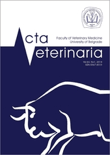
ACTA VETERINARIA-BEOGRAD
Connecting global insights in veterinary studies.ACTA VETERINARIA-BEOGRAD is a distinguished academic journal dedicated to the field of veterinary science, focusing on a broad spectrum of topics pertinent to veterinary medicine and animal health. Published by SCIENDO, this journal has been an open-access resource since 2014, facilitating the dissemination of valuable research findings and innovations to a global audience. With an ISSN of 0567-8315 and an E-ISSN of 1820-7448, it plays a critical role in promoting accessible knowledge in veterinary practices while contributing to the advancement of the field. Located in Poland, this journal notably ranks in the Q3 quartile for veterinary studies, reflecting its ongoing commitment to quality and relevance. The journal welcomes contributions from a diverse range of veterinary disciplines, making it a vital platform for researchers, practitioners, and students alike who aspire to advance their understanding and impact within the veterinary community.

PESQUISA VETERINARIA BRASILEIRA
Connecting researchers to elevate animal health.PESQUISA VETERINARIA BRASILEIRA is a premier scholarly journal that serves as a vital platform for disseminating high-quality research in the field of veterinary sciences. Published by REVISTA PESQUISA VETERINARIA BRASILEIRA, this Open Access journal has been a beacon of knowledge since 1997, allowing global access to its valuable content and fostering collaboration among researchers, professionals, and students. With an ISSN of 0100-736X and an E-ISSN of 1678-5150, it stands out for its commitment to enhancing the understanding of veterinary practices, animal health, and public health implications in the context of Brazil and beyond. As of 2023, it holds a Q3 category in veterinary miscellaneous and ranks at the 43rd percentile according to Scopus, reflecting its growing influence and contribution to the veterinary community. Based in Seropédica, Rio de Janeiro, this journal publishes research covering a wide range of topics, aiming to facilitate knowledge exchange and drive innovation within the field. Join the conversation and contribute to the advancement of veterinary science through your submissions and readership.

Revista Romana de Medicina Veterinara
Transforming veterinary care through groundbreaking research.Revista Romana de Medicina Veterinara is a leading peer-reviewed journal dedicated to the field of veterinary medicine, published by the General Association of Romanian Veterinarians. With its ISSN 1220-3173 and E-ISSN 2457-7618, the journal aims to advance the domain of veterinary science through dissemination of high-quality research articles, case studies, and reviews that cover a wide array of topics including animal health, veterinary diagnostics, and treatment methodologies. Although primarily focused on the Romanian veterinary landscape, its scope is designed to engage a global audience of researchers, practitioners, and students seeking to enhance their knowledge and practice in veterinary medicine. The journal is committed to open accessibility, ensuring that vital research is readily available to the academic community without financial barriers, thereby encouraging collaboration and innovation. By providing a platform for cutting-edge veterinary research, Revista Romana de Medicina Veterinara plays a crucial role in fostering advancements that can significantly impact animal health and welfare both locally and internationally.

ACTA VETERINARIA SCANDINAVICA
Championing excellence in veterinary scholarship.ACTA VETERINARIA SCANDINAVICA is a prestigious open-access journal dedicated to advancing the field of veterinary science and promoting interdisciplinary research. Published by BMC since 2001, this journal has become a vital resource for veterinarians, researchers, and students worldwide, with an ISSN of 0044-605X and an E-ISSN of 1751-0147. With a remarkable impact factor reflecting its relevance—ranking in the Q2 quartile for Veterinary (miscellaneous) and Q3 for Medicine (miscellaneous)—ACTA VETERINARIA SCANDINAVICA focuses on a broad spectrum of veterinary topics, ensuring that critical research is available to the academic community and beyond. Located in the United Kingdom, this journal has successfully converged its publishing efforts from 1960 to 2024, highlighting its long-standing commitment to veterinary excellence. Researchers are encouraged to submit their work through the journal’s user-friendly platform, contributing to the ever-evolving landscape of animal health and welfare.

Iranian Journal of Veterinary Research
Connecting Research and Practice for Animal WelfareWelcome to the Iranian Journal of Veterinary Research (IJVR), a prestigious platform dedicated to advancing the field of veterinary science. Published by Shiraz University, this journal plays a pivotal role in disseminating high-quality research findings amid a vibrant academic community. With its ISSN 1728-1997, and a convergence of studies from 2008 to 2024, IJVR serves as an essential resource for veterinarians, researchers, and students interested in Animal Science and Zoology. Recognized in the Q3 quartile for both Animal Science and Veterinary categories, it holds a respectable position with Scopus rankings placing it in the 54th percentile among general veterinary journals. Although it currently lacks an open access model, the journal ensures that cutting-edge veterinary research is presented with rigor and relevance, fostering knowledge that contributes to animal health and welfare. With its strategic focus on innovative methodologies, clinical practices, and the biological sciences, the IJVR is set to become your go-to source for critical advancements in veterinary research.
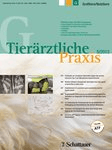
TIERAERZTLICHE PRAXIS AUSGABE GROSSTIERE NUTZTIERE
Connecting researchers and practitioners in large animal veterinary science.TIERAERZTLICHE PRAXIS AUSGABE GROSSTIERE NUTZTIERE is a pivotal journal in the field of veterinary science, focusing specifically on large animals and food production animals. Published by GEORG THIEME VERLAG KG, this journal has been a resource for veterinary professionals since its inception in 1996, delivering current research and practical insights to its readership through 2024. Despite its classification in the Q4 quartile for both Food Animals and Veterinary (miscellaneous) categories, the journal provides an essential platform for emerging studies, contributing to the interdisciplinary dialogue around veterinary practices. Researchers and practitioners benefit from the journal’s commitment to advancing knowledge, despite its modest rankings in Scopus where it stands at rank #150 in General Veterinary and #32 in Food Animals. While not currently offering Open Access options, the journals’ significant body of work remains an invaluable asset for those dedicated to enhancing animal health and welfare. TIERAERZTLICHE PRAXIS serves as a cornerstone for academic exploration and practical application in the veterinary field, fostering a deeper understanding of the complexities involved in animal care and management.
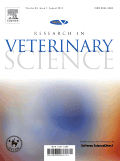
RESEARCH IN VETERINARY SCIENCE
Driving Evidence-Based Practices in Veterinary MedicineRESEARCH IN VETERINARY SCIENCE, published by Elsevier Science Ltd, stands as an authoritative platform in the field of veterinary studies. With its origins dating back to 1965, this prestigious journal is recognized for its contribution to the advancement of veterinary knowledge and practices, boasting a remarkable Q1 categorization in Veterinary (miscellaneous) and ranking 24th out of 194 in the Scopus veterinary general category, placing it in the top 13% of its field. The journal presents a diverse range of research articles that explore critical topics in veterinary science, thereby facilitating evidence-based practices and innovations. Although currently not an open-access journal, it remains highly accessible through institutional and personal subscriptions, allowing researchers, professionals, and students to benefit from its rich collection of studies. As it moves toward 2024, RESEARCH IN VETERINARY SCIENCE continues to be a vital resource for those dedicated to improving animal health and advancing veterinary science.
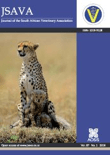
Journal of the South African Veterinary Association
Advancing Veterinary Science Through Open AccessJournal of the South African Veterinary Association is a prominent Open Access journal dedicated to advancing the field of veterinary science since its inception in 1945. Published by MEDPHARM PUBLICATIONS PTY LTD, this journal stands out with an impactful HIndex and a commendable categorization in 2023, ranking Q3 in Medicine (miscellaneous) and Q2 in Veterinary (miscellaneous). With a Scopus rank of 96 out of 194 in the veterinary field, it serves as an essential resource for researchers, veterinary professionals, and students, promoting the dissemination of high-quality research and knowledge. The journal offers a platform for peer-reviewed articles covering diverse topics relevant to veterinary and animal health issues, encouraging expansive dialogue and collaboration within the academic community. Based in Centurion, South Africa, and accessible globally since it adopted an Open Access model in 1997, the journal exemplifies a commitment to accessibility and the sharing of knowledge.